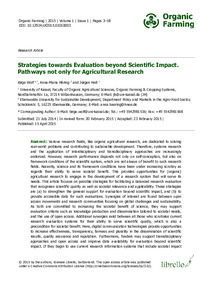| dc.date.accessioned | 2016-01-19T09:36:15Z | |
| dc.date.available | 2016-01-19T09:36:15Z | |
| dc.date.issued | 2015 | |
| dc.identifier.issn | 2297-6485 | |
| dc.identifier.uri | urn:nbn:de:hebis:34-2016011949741 | |
| dc.identifier.uri | http://hdl.handle.net/123456789/2016011949741 | |
| dc.description.sponsorship | Gefördert durch den Publikationsfonds der Universität Kassel | |
| dc.language.iso | eng | |
| dc.publisher | Librello | |
| dc.rights | Urheberrechtlich geschützt | |
| dc.rights.uri | https://rightsstatements.org/page/InC/1.0/ | |
| dc.subject.ddc | 630 | |
| dc.title | Strategies towards evaluation beyond scientific impact | eng |
| dc.type | Aufsatz | |
| dcterms.abstract | Various research fields, like organic agricultural research, are dedicated to solving real-world problems and contributing to sustainable development. Therefore, systems research and the application of interdisciplinary and transdisciplinary approaches are increasingly endorsed. However, research performance depends not only on self-conception, but also on framework conditions of the scientific system, which are not always of benefit to such research fields. Recently, science and its framework conditions have been under increasing scrutiny as regards their ability to serve societal benefit. This provides opportunities for (organic) agricultural research to engage in the development of a research system that will serve its needs. This article focuses on possible strategies for facilitating a balanced research evaluation that recognises scientific quality as well as societal relevance and applicability. These strategies are (a) to strengthen the general support for evaluation beyond scientific impact, and (b) to provide accessible data for such evaluations. Synergies of interest are found between open access movements and research communities focusing on global challenges and sustainability. As both are committed to increasing the societal benefit of science, they may support evaluation criteria such as knowledge production and dissemination tailored to societal needs, and the use of open access. Additional synergies exist between all those who scrutinise current research evaluation systems for their ability to serve scientific quality, which is also a precondition for societal benefit. Here, digital communication technologies provide opportunities to increase effectiveness, transparency, fairness and plurality in the dissemination of scientific results, quality assurance and reputation. Furthermore, funders may support transdisciplinary approaches and open access and improve data availability for evaluation beyond scientific impact. If they begin to use current research information systems that include societal impact data while reducing the requirements for narrative reports, documentation burdens on researchers may be relieved, with the funders themselves acting as data providers for researchers, institutions and tailored dissemination beyond academia. | eng |
| dcterms.accessRights | open access | |
| dcterms.alternative | Pathways not only for agricultural research | ger |
| dcterms.bibliographicCitation | In: Organic farming. - Basel : Librello, 2015, Vol. 1, 1, 3-18 | |
| dcterms.creator | Wolf, Birge | |
| dcterms.creator | Häring, Anna-Maria | |
| dcterms.creator | Heß, Jürgen | |
| dc.publisher.place | Basel | |
| dc.relation.doi | doi:10.12924/of2015.01010003 | |
| dcterms.source.issue | 1 | |
| dcterms.source.journal | Organic farming | |
| dcterms.source.pageinfo | S. 3-18 | |
| dcterms.source.volume | 1 | |

